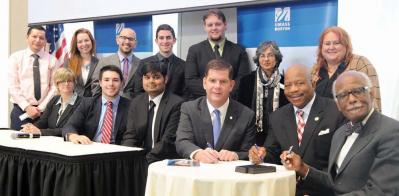December 17, 2014
 Mayor Walsh and UMass Boston Chancellor Keith Motley signed an agreement last Friday that will continue the university’s new Mayor’s Policy Symposium into future years. That same day, the inaugural class briefed the mayor on its ideas for revitalizing the Strand Theatre. Harry Brett/UMB photo
Mayor Walsh and UMass Boston Chancellor Keith Motley signed an agreement last Friday that will continue the university’s new Mayor’s Policy Symposium into future years. That same day, the inaugural class briefed the mayor on its ideas for revitalizing the Strand Theatre. Harry Brett/UMB photo
A team of students from UMass Boston’s Honors College laid out two proposals aimed at revitalizing Uphams Corner’s iconic Strand Theatre last week in a public presentation at the university’s Columbia Road campus. Seated in the audience among the 100-plus people who turned out for the PowerPoint walk-throughs was the one person in the city who could make the students’ admittedly ambitious plans viable: Mayor Martin Walsh.
The eight-member class spent the fall semester immersed in the minutiae of the Columbia Road landmark, reviewing earlier plans for revivals and studying what has worked at similar urban theatres across the country. Led by their professor, Dr. Erin O'Brien, and informed by an array of guest speakers, the political science students were charged with giving Walsh concrete recommendations on how the city could “enliven and enrich” the city-owned theatre, which opened as a movie house in 1918.
The students were aligned in two teams of four: One comprising Luc Figueiredo Miller, Lucas Goren, Emma Hays, and Martin Mulkerrin, and the second including Ryan McGoff, Jose Martinez, Anant Verma, and Meredith Hossfield./
After sitting through the hour-long presentation, Walsh called the students’ work “very impressive,” adding, “I think what the young people here are talking about, creating a cultural district in Uphams Corner, makes all the sense in the world. When you think about cultural districts, you think about downtown or big urban areas. This is an opportunity to bring back some revitalization to a neighborhood and the Strand certainly has historic value.”
Walsh noted that the Strand has been a “political stop” for decades – from Mayor Kevin White’s inauguration to his own 2013 mayoral campaign kick-off and election eve rallies. “Now we need to see how to make an investment here to keep it going,” said Walsh.
How much investment? The two proposals assembled by the students each came with a steep bottom line in their final pitch. The first group called on the Walsh administration to pump $15 million into Uphams Corner, with a targeted $3 million just for additional infrastructure improvements at the Strand. The second group upped the ante, recommending a $25 million “one-time capital investment” to renovate the lobby and make other physical improvements to the theatre. Both proposals called for the city to increase its annual operating budget for the Strand. One proposed an additional $500,000, the other an extra $750,000.
As Walsh noted, one of the teams recommended that the mayor should designate Uphams Corner as a Cultural District, a move that would make it one of three in the city of Boston.
Over a ten-year period, the Menino administration committed a large chunk of city dollars— some $10 million— into making improvements to the Strand’s physical plant, including adding a digital marquee on the exterior, making upgrades to the heating and cooling systems, and installing new lighting and sound equipment.
When he was asked about the students’ new capital spending recommendations, Walsh was non-committal. “You have to program it, too. You can’t just put money into it and not program it. It has to be a plan,” he said. “You can’t just say ‘now it’s built or fixed.’ The investment that was made in the Strand over the years has kept it from falling in, but there are still much-needed capital investments there on the stage, on the curtains, on the lights, the seats, the handicapped accessibility. It’s a matter of sitting down and making an investment based on what the programming could be.”
Robert Haas, a longtime Uphams Corner resident and former member of a board of directors that once oversaw operations at the Strand, said that the mayor’s office has the power to make the theatre viable. “This should have happened a long time ago,” he said. “The city has to be willing to give the Strand the operating budget it needs to succeed.”
One step that the teams of students agreed on was that the Strand needs to reconstitute a standing board of directors, a key management piece that has been lacking at the theatre since the late 1990s. It is currently staffed by one full-time city employee who lacks the staff support needed to manage, market, and program the theatre effectively.
The city has owned the theatre since the early 1970s when a group of community residents persuaded then-Mayor Kevin White to save the shuttered building from demolition. They formed a non-profit – the M. Harriet McCormack Center for the Arts – which supervised the Strand’s management and the events held there, which through much of the 1980s and 1990s included a robust roster of shows and community presentations along with a summer teen program that trained young people in arts management.
One of the two UMass Boston teams called on the Strand to bring back the Strand Teen Players and use paid interns to help manage the theatre. That idea and others included in the reports were met with applause from one of the Strand’s key present-day stakeholders.
“I think it’s wonderful,” said Meg Fofonoff, president of the Fiddlehead Theatre Company, which is in residence at the theatre. “Bringing the Strand to the forefront of Boston at large as a venue and a resource for the community – and all the talk about internships. These are things that I’ve been wanting to do. So many people are wowed when they walk into that space, the beauty and grandeur of that theatre,” she added.
Fofonoffe acknowledges that there are more improvements that can be made to attract a crowd and keep them coming back – from more comfortable seats to getting a liquor license to serve adult drinks to a theatre crowd. She conceded, too, that the lack of close-in parking remains a hurdle that some prospective theatre-goers complain about.
At the close of Friday’s presentations, the mayor signed a memorandum of understanding with UMass Boston Chancellor J. Keith Motley that the city will continue a partnership with the university’s Honors College to continue the Mayor’s Policy Symposium in future semesters.
More coverage on the UMass Boston Mayoral Policy Symposium: UMass Boston students Luc Figueiredo Miller and Emma Hays discuss their recommendations for more effective use of the Strand Theatre in Dorchester. Interview for BNN News. Aired December 16, 2014.
Students Outline Strategy to Revitalize Strand Theatre from Chris Lovett on Vimeo.
Villages:
Topics:


